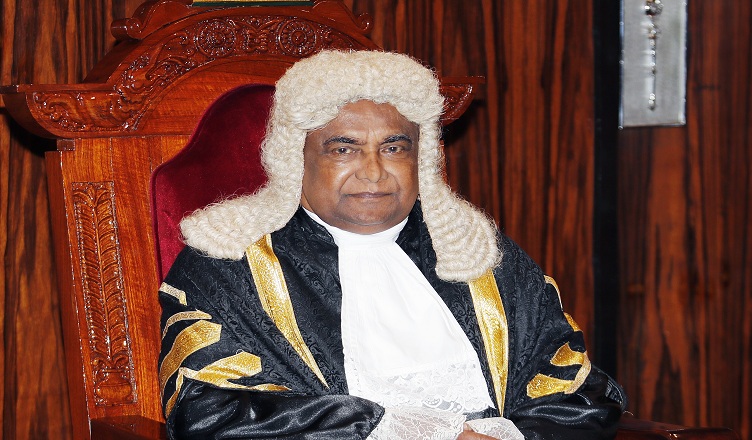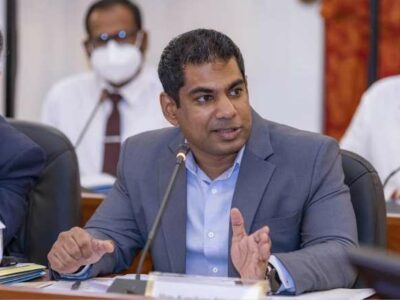(LANKAPUVATH | COLOMBO) – Sri Lanka’s Supreme Court has determined that several clauses of the government’s Special Goods & Services Tax Bill are inconsistent with the Constitution and the bill requires not only a two-third majority in Parliament but also a public referendum for it to be passed.
Speaker of Parliament, Mahinda Yapa Abeywardena conveyed the Supreme Court’s determination on the bill which was challenged in the Supreme Court in terms of Article 121(1) of the Constitution to the Members of Parliament when the parliament convened today at 10.00 a.m.
The Speaker said the Supreme Court has further stated that since it would be impracticable to suggest clause specific amendments to the Clauses of the Bill that have been found to be inconsistent with the Constitution as it would fundamentally alter the basic nature and structure of the Bill and become inconsistent with the declared objectives of the Bill, the Court while exercising discretion conferred on it by the Constitution will refrain from determining the manner in which the Clauses 2, 3, 4, 5 and X(1) could be amended so as to alter such Clauses to become consistent with the Constitution.
The Supreme Court has made following determinations in in terms of Article 120 read with 123 of the Constitution.
(i) Clauses 2, 3 and 4 of the Bill are jointly and severally inconsistent with Article 148 read with Article 76(1) of the Constitution.
(ii) Clauses 2, 3 and 4 of the Bill are inconsistent with Article 3, read with Article 4(a) and 4(d) of the Constitution.
(ii) Clauses 2, 3 and 4 of the Bill are inconsistent with Article 12(1), read with Article 3 and 4(d) of the Constitution.
(iv) Clauses 2 and 3 of the Bill are inconsistent with Article 152 of the Constitution.
(v) Clause 9(1) of the Bill is inconsistent with Article 148 of the Constitution.
(vi) Clause 9(1) of the Bill is inconsistent with Article 149(1) and 150(1) of the Constitution.
(vii) Clauses 11(1) and 11(3) of the Bill are inconsistent with Article 4(c) read with Article 3 of the Constitution.
(viii) The Supreme Court has further stated that in view of the analysis contained in this Determination and the foregoing conclusions, and—
(a) in view of the inseparable nature of Clauses 2, 3, and 4 of the Bill;
(b) the compelling need to consider such Clauses of the Bill both individually and as a whole;
(c) as it is necessary to view Clauses 2, 3, and 4 of the Bill in conjunction with the remaining Clauses of the Bill; and
(d) the finding arrived at by the Supreme Court in Clauses 2, 3, and 4 of the Bill irremediably inconsistent with Article 3 a with 4(a) and 4(d) of the Constitution and Articles 12(1), 76(1) and 148 of the Constitution,
acting in terms of Article 123(2)(c) of this Constitution, this Court holds that the “Special Goods and Services Tax” Bal requires to be passed as required by Article 84(2) of the Constitution, by not less than two-thirds of the whole number of Members of Parliament (including those not present) voting in favour thereof and approved by people at a Referendum by virtue of the provisions of Article 83 of the Constitution.
The Speaker ordered that the Determination of the Supreme Court be printed in the Official Report of today’s proceedings of the House.
Inland Revenue Commissioners’ Association including its chairman MP Sarath Abeyratne, the General Secretary of the Samagi Jana Balawegaya, MP Ranjith Madduma Bandara, and the Bar Association of Sri Lanka filed petitions alleging that the Special Goods and Services Tax Bill introduced by the government in Parliament is unconstitutional.
The petitions allege that paragraph 2 (3) of the Bill empowers the Finance Minister to impose taxes on special goods and services, which would erode the power of Parliament and violate Article 76 (1) of the Constitution.
The petitioners allege that certain provisions of the proposed bill curtail the powers of the Inland Revenue Department and the financial powers of Parliament.
The petitions also state that the bill empowers the accumulated taxes to be credited to personal accounts without the control and audit of Parliament.
Therefore, the petitioners have sought a declaration that 13 provisions of the Bill are in violation of the Constitution and an order should be issued to pass the Bill by a two-thirds majority in Parliament and a referendum.



